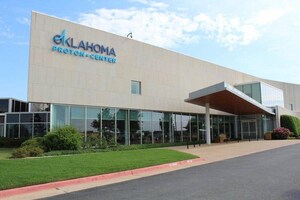
OKLAHOMA CITY, June 5, 2019 /PRNewswire/ -- Proton therapy results in fewer side effects than traditional X-ray radiation therapy for many cancer patients, according to a new study led by Washington University School of Medicine in St. Louis and the Perelman School of Medicine at University of Pennsylvania.
The study included almost 1,500 patients receiving combined chemotherapy and radiation therapy for lung, brain, head and neck, gastrointestinal and gynecologic cancers that had not yet spread to other parts of the body. Such patients receive both radiation and chemotherapy, a treatment regimen that often cures nonmetastatic cancer, but can result in severe side effects leading to hospitalization.
"On a large-scale level across a variety of tumors, this study reinforces the general principle of radiation therapy treatment: less exposure to healthy tissue as achieved with proton therapy results in less damage," said Dr. Mark Storey, Medical Director, Clinical Operations, at the Oklahoma Proton Center.
After controlling for differences between the groups, such as age and additional medical problems, the researchers found that patients receiving proton therapy experienced a two-thirds reduction in the relative risk of severe side effects within 90 days of treatment, compared with patients receiving X-ray radiation therapy. Forty-five of 391 patients receiving proton therapy experienced a severe side effect in the 90-day time frame (11.5 percent). In the X-ray radiation therapy group, 301 of 1,092 patients experienced a severe side effect in the same period (27.6 percent).
In the release from Washington University, Dr. Brian Baumann, an assistant professor of radiation oncology at Washington University and an adjunct assistant professor of radiation oncology at Penn, commented: "The opportunity to reduce the risk of severe side effects for patients and thereby improve their quality of life is very exciting to me. While there have been other studies suggesting that proton therapy may have fewer side effects, we were somewhat surprised by the large magnitude of the benefit."
The researchers also found no differences between the two groups in survival, suggesting that proton therapy was just as effective in treating the cancer even as it caused fewer side effects. Overall survival at one year for the proton therapy group was 83 percent of patients versus 81 percent for the X-ray radiation therapy group.
"This is a tremendous study that reinforces the benefits of proton therapy and aligns with our mission - a cure is not enough; the quality of the life saved is just as important," said Dr. John Chang, Medical Director, Clinical Research and Education at the Oklahoma Proton Center.
This study is the first large review of data across several cancer types to show a reduced side-effect profile for proton therapy compared with X-ray radiation therapy for patients receiving combined chemotherapy and radiation.
Patients in the proton group had fewer side effects despite the fact that they were older — with an average age of 66 — than patients in the X-ray radiation therapy group — with an average age of 61.
About proton therapy:
Proton Therapy is the most precise form of radiation treatment for cancer available in the U.S. today. Unlike other forms of radiation used in cancer care such as X-Rays, protons stop inside tumors thus reducing the healthy tissue exposed to radiation during treatment. More than 175,000 patients have been treated with proton therapy worldwide and there are 31 proton centers currently in operation in the U.S. Proton Therapy is routinely used to treat solid tumors including prostate, breast, brain, head and neck, lung, esophageal, soft tissue and pediatric tumors.
About Oklahoma Proton Center
Oklahoma Proton Center ("OPC") is a state-of-the-art proton therapy center in Oklahoma City, OK. The 60,000 square foot facility opened in August of 2009 and has four treatment rooms that utilize the precision of proton particles to treat a variety of cancers. The center is attached to the INTEGRIS Cancer Institute. The combined comprehensive outpatient cancer facility is the largest community cancer center in the region offering proton therapy in conjunction with other advanced therapies for cancer. OPC is dedicated to excellent patient care and advancing proton therapy through innovation and clinical research.
David Raubach
Chief Development Officer
(918) 798-9160
[email protected]
SOURCE Oklahoma Proton Center








Share this article